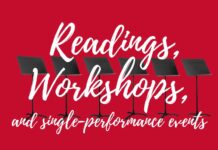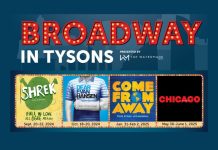Female theatre artists make up more than 50 percent of those involved in the theatre, yet the number of female playwrights being produced is dramatically lower. Welcome back to the conversation, and The Playwright’s Playground – an in-depth Playwright interview series with female playwrights in the D.C. theatre community.

This month it is my pleasure to share an interview with Suzan-Lori Parks, the Pulitzer Prize-winning playwright of Topdog/Underdog, and writer of the adaptation of the 2012 Tony Award-winning Best Musical Revival, The Gershwins’ Porgy and Bess. Currently on a 14-city tour, The Gershwins’ Porgy and Bess, is playing at the National Theatre in Washington, D.C. until tomorrow, December 29th.
In Part I: Suzan-Lori speaks candidly about her writing motivations and the changes made in her adaptation of Porgy and Bess, and shares details about her favorite song in the production.
________________________
SUZAN-LORI PARKS
“My writing all comes from listening. The more I listen, the more I can write.”
One of the boldest, most thought-provoking voices in American theater today is Pulitzer Prize-winning playwright Suzan-Lori Parks. Parks is the first African-American woman to win the Pulitzer Prize in Drama. Her writing style comes from listening, and that observant reflection has a deep resonance and influence on the rhythmic aesthetic and distinction of her writing. In addition to the Pulitzer win for her 2001 play Topdog/Underdog, Suzan-Lori Parks won a Tony Award in 2002 for the play, and was awarded a MacArthur Foundation “Genius Grants” grant that same year.

Suzan-Lori Parks first feature film was Girl 6 (1996) directed by Spike Lee, and in 2005 she adapted Zora Neale Hurston’s novel, Their Eyes Were Watching God produced by Oprah Winfrey’s Harpo Productions. Parks also wrote the book for Unchain My Heart, The Ray Charles Musical for Broadway in 2010.
The reimagined musical version, The Gershwins’ Porgy and Bess, directed by Diane Paulus (2013 Tony winner for Pippin) and adapted by Suzan-Lori Parks, won the Tony Award in 2012 for best musical revival. Conceived to bring the story to a broader audience beyond opera, Parks said she wanted to adapt the book so that it matched the music in importance. “We wanted to make it better.”
Known for creating theater that uses rhythmic, poetic language, a core element of her writing style is repetition and revision, and her style is often highly metaphorical. She said the idea of repetition with revision means “looking back and stepping forward at the same time.”
In the continuation of Part 1, it was immediately striking to me, how often this core philosophy was reflected in her thought process and conversation.
________________________
Sydney-Chanele: When you approach your original work, do you start with a concept, idea, or a theme? What is your process?
Suzan-Lori: As far as I know, I have yet to start out with a theme. I think I end up with themes but I don’t know really what they are. (She laughs). The audiences, the dramaturg, and maybe the director and actors can glean themes … but I’m not really that kind of writer. There is a lot of worth in that type of writer, that’s just not the type of writer I am.
I pretty much start with characters. I’m pretty much a character-based writer or I might start with a title, or a string of words that I happen to enjoy. Topdog/Underdog was like that, although the play didn’t come from the title. I wrote the title-phrase down, and stuck it on a Post-It on my wall.
Three years later I wrote the play. See what I mean. It wasn’t a theme. I wasn’t writing a Topdog/Underdog theme. I wasn’t thinking anything like that.
Sometimes a word or phrase will just click as inspiration?
Huh-hmm. More often than not the character is the inspiration.
Interesting you say the character is the inspiration, but it all comes from within. Which of your original works would you say is the most autobiographical?
None of them. No. Because how does one define oneself? So you say myself.
But isn’t there a part of you in all of your work?
Yes. But… I think all of my work is autobiographical. There! . . .even Porgy and Bess! I say this because of how I define self. My self is part of the greater face of human kind. That’s how I see myself. You know what I mean? So it’s all autobiographical.
I write about Lincoln and Booth, and no, I’m not a man in one room living with my brother… (Topdog/ Underdog), of course not … I’m not Hester La Negrita who lives with her five children underneath a bridge. (In the Blood). I’m not Hester Smith who has a son in prison (Fucking A). Or, on and, and on … But I see them all as autobiographical because I see my Self (uppercase S, she says to clarify the punctuation specifics) as a part of the great mosaic. When I write, I see that as being true.
So, what is the distinction between the upper and lowercase in self?
The lowercase is – me, me, me, me … (The pace of her talking speeds up, and her tone becomes playful as she continues). I have a two-year-old, and ten times a day I have to wipe his behind. You know what I’m saying? In which case, I probably wouldn’t write about it, but I’d probably just wipe his behind.
If I use the word ‘personal’ to replace ‘autobiographical’, would that be a better way of asking about what parts of your life have been directly reflected in your work?
They’re all personal. They’re all personal. This is the thing. I am different from most writers. You know what I mean. I’m just different.
They are all personal. All the feelings that all the characters feel in all the plays, and in my novel (Getting Mother’s Body: A Novel), and the movies that I’ve written (Girl 6, Their Eyes Were Watching God). I have felt all of those feelings.
You know, Virginia Wolf, her character Lily, in To the Lighthouse, she was not inventing. She was merely unfolding something that she was given. She was saying something that she had been given, folded up long ago.
These days we tend to be taught a very limited view of what an artist does – with the memoir or reality shows. There is a lot more there. I’m following in the tradition of some great writers. Shakespeare may well have been Queen Elizabeth. But he was also Queen Elizabeth, and King Lear, and Macbeth, and Richard III … He was all of those people.
Speaking of Reality TV, and the view of art, I read a quote by your husband, that you have said is one of your favorites, ‘the concept of talent is very overrated.’ Does that statement reflect in some way the point that you’re making?
Right. Well, I don’t know. I don’t really watch too much Reality TV… But, I think he was talking about so many people think you have to be – “Talent! Oh my God Talent!” (Her voice rises to a high pitch, enthusiastic shout) “Prodigy at three!’ to become an artist, you know.
Or, yesterday, I was doing Watch Me Work, my performance show/free writing class that I do every week for the Public Theatre. Yesterday, we had 50 high school student in there. It was fantastic. And, one of the teachers afterwards said, “That one, do you think that kid right there has promise? Don’t you think? Don’t you think”’ This kid was bright, and shiny, and asked interesting questions. But, in my mind, they all have promise.
The meaning of ‘The concept of talent is overrated’ is not that you’re a prodigy at age twelve… or you get picked by the NY Times Twenty Under Twenty. No. What is important is how much you love your craft and how much you work art it. You know what I mean. That’s what’s important.
Understood. How important then is the winning and the achievement of the awards that you have won, like the Pulitizer Prize, The Obie Awards, The MacArthur Genuis Grant? And, how have those wins influenced the projectory of your career?
I think it allows me to do things that perhaps I wouldn’t be allowed to do. It allows me to reach more people. I know I have. High school students read Topdog/Underdog. I’ve written things that have moved people, and (winning awards) has allowed me to, with greater ease, do more of that. So for that reason awards are important, you know.
For me what do they mean…at the end of the day do they help me write? I don’t know, I’m going to ask my Pulitzer to get off the shelf and write something.
I am completley honored and thrilled to win awards. It provides you time, and they are very generous. But the weird thing about those awards is that when you are ‘Prized,’ you are called upon to represent, and I enjoy doing that. I enjoy being a spokesmodel for what a Pulitzer Prize winner looks like and behaves like. I totally will do that, and will stand in front of the high school kids for free on my own time, you know. And it’s fun. I will give free writing classes at the Public Theatre. I feel that I have been called to represent. I represent – this is what we look like, this is what we do, this is how we might behave.
Besides being a Pulitzer Prize winner, do you feel like you are representing being an African-American female?
Sure. Sure, and as someone of my generation… and I’m representing being an American. The State Department has sent me to India, Myanmar, and Cambodia to represent the United States. I go all over Europe and represent the United States. I do this so kids – like yesterday – can look at me and go, ‘Wow. It’s not just some stuffy person who we can’t relate to, or someone with a message that doesn’t really mean anything.’
You’re making it more accessible.
It’s not the least common denominator though – it’s not dummying it down. It’s keeping it real. (Her voice becomes animated) “We’re not lowering our standards, so that more people can understand us. I’m actually raising the bar, and telling those gathered – Leap! Because that’s who we are,” she says with excited enthusiasm. That’s who we are!
That is who we are. It doesn’t really seem real or possible, until you’ve experienced the possibility in some real way for yourself.
Exactly. Exactly. That’s it, exactly. That goes for kids growing up today, young audiences, and it goes for your audiences. So, I think the prizes allow me to go out there and represent what it means to be a working artist, given some prizes. It’s wonderful for people.

What’s next on your plate? I know you’re doing Father Comes Home from the Wars.
Yes! Father Comes Home from the Wars is going into rehearsal in February. That will be at the New York Public Theatre, and Watch Me Work, we do every week at the Public Theatre. So you all should check that out.
Is it a full length play?
It’s a performance piece that I do every week; I’ve been doing it for several years in the lobby of the Public Theatre. It’s a performance piece and also a free writing class and it live streams. You can actually join us online, and tweet in your writing questions about your working process and we will answer them live with the people gathered in the lobby of the Public Theatre!
The Gershwins’ Porgy and Bess plays through this Sunday, December 29, 2013 at The National Theatre – 1321 Pennsylvania Avenue, NW, in Washington, DC. For tickets, (800) 514-3849, or purchase them online.
LINKS
Suzan-Lori Parks website.
Playwright’s Playground by Sydney-Chanele Dawkins:
‘The Playwright’s Playground Series’: Jacqueline E. Lawton-Part 1, Part 2, and Part 3 by Sydney-Chanele Dawkins.
‘The Playwright’s Playground’: Allyson Currin – Part 1 and Part 2 by Sydney-Chanele Dawkins.
Watch the entire Otto Preminger directed 1959 film version of Porgy and Bess:
https://youtu.be/5daT-MSf09I




